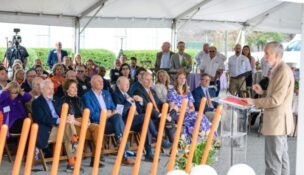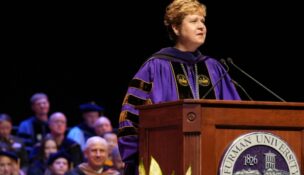Clemson University gets $4.1M for heart research
Staff Report //February 14, 2019//
Clemson University bioengineers picked Valentine’s Day to announce $4.1 million in grants to support new heart health research.
Will Richardson and Naren Vyavahare are conducting research with the potential to affect millions of patients who suffer from many forms of cardiovascular disease and related illness, including heart failure, hypertension, chronic kidney disease and Type 2 diabetes, according to a university news release.
Richardson, an assistant professor of bioengineering, is creating computer models aimed at providing better treatment for cardiac fibrosis, a condition that contributes to heart failure. As many as 60% of patients die within five years of developing heart failure, which afflicts 6.5 million Americans, Richardson said in the news release.
No drugs have been approved to treat cardiac fibrosis specifically, and doctors are often left with trial-and-error experimentation when treating patients who have it, he said in the release.
Richardson said he hopes his research will lead to a day when measurements from a patient’s blood or tissue sample can be plugged into mathematical equations based on how molecules interact in the body. Overnight, patients would have personalized risk assessments and treatments plan, he said in the release.
Details about his research is available online.
Vyavahare, the Hunter Endowed Chair of Bioengineering, is working on what could be the first treatment to reverse vascular calcification, a condition that occurs when mineral deposits build up on blood vessel walls and stiffen them, according to the news release. It is most prevalent in aging patients and those with chronic kidney disease and Type 2 diabetes, Vyavahare said. Complications from vascular calcification can range from hypertension to death.
The nanoparticles that Vyavahare is developing are many times smaller than the width of a human hair and would deliver two medicines to calcified blood vessels. One medicine would remove the mineral deposits that cause blood vessels to become calcified, and another would return elasticity to the blood vessels.
More details about his work is online.
The Richardson and Vyavahare projects were both funded through the National Institutes of Health’s R01 program. Richardson is receiving $1.9 million, and Vyavahare is receiving $2.2 million, the news release said.
Anand Gramopadhye, dean of the College of Engineering, Computing and Applied Sciences, congratulated Richardson and Vyvahare on their grants.
Agneta Simionescu, an assistant professor of bioengineering, has also received $1.38 million through the R01 program. The Simionescu award was announced in November and is aimed at better understanding cardiovascular disease in patients with diabetes, the news release said.
Richardson and Simionescu were among the faculty members trained as part of SC BioCRAFT, a National Institutes of Health Center of Excellence. The center’s primary goal is to increase the number of South Carolina biomedical researchers who are supported by grants from the National Institutes of Health.
Vyavahare leads SC BioCRAFT, which stands for the South Carolina Bioengineering Center for Regeneration and Formation of Tissues.
g















